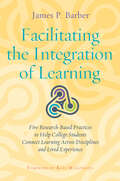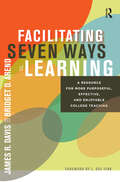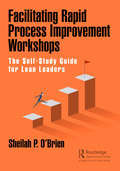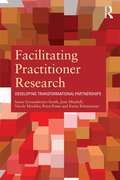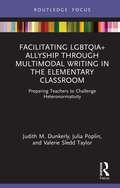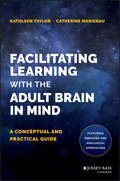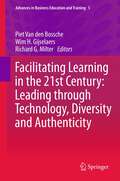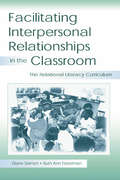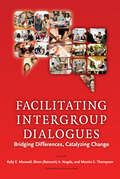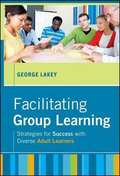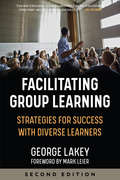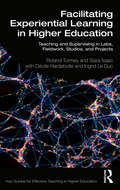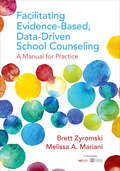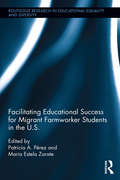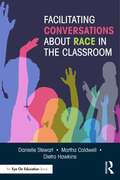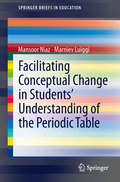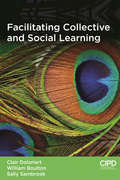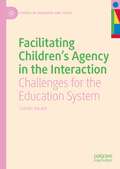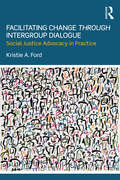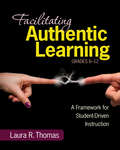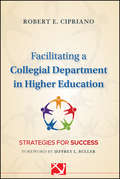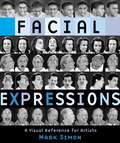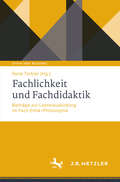- Table View
- List View
Facilitating the Integration of Learning: Five Research-Based Practices to Help College Students Connect Learning Across Disciplines and Lived Experience
by James P. BarberStudents’ ability to integrate learning across contexts is a critical outcome for higher education. Often the most powerful learning experiences that students report from their college years are those that prompt integration of learning, yet it remains an outcome that few educators explicitly work towards or specify as a course objective. Given that students will be more successful in college (and in life) if they can integrate their learning, James Barber offers a guide for college educators on how to promote students’ integration of learning, and help them connect knowledge and insights across contexts, whether in-class or out-of-class, in co-curricular activities, or across courses and disciplinary boundaries. The opening chapters lay the foundation for the book, defining what integration of learning is, how to promote it and students’ capacities for reflection; and introduce the author’s research-based Integration of Learning (IOL) model.The second section of the book provides practical, real-world strategies for facilitating integration of learning that college educators can use right away in multiple learning contexts. James Barber describes practices that readers can integrate as appropriate in their classes or activities, under chapters respectively devoted to Mentoring, Writing as Praxis, Juxtaposition, Hands-On Experiences, and Diversity and Identity. The author concludes by outlining how to apply IOL to a multiplicity of settings, such as a major, a single course, programming for a student organization, or other co-curricular experience; as well as offering guidance on assessing and documenting students’ mastery of this outcome.This book is addressed to a wide range of educators engaged with college student learning, from faculty to student affairs administrators, athletic coaches, internship supervisors, or anyone concerned with student development.
Facilitating Seven Ways of Learning: A Resource for More Purposeful, Effective, and Enjoyable College Teaching
by James R. Davis Bridget D. ArendFor teachers in higher education who haven’t been able to catch up with developments in teaching and learning, James Davis and Bridget Arend offer an introduction that focuses on seven coherent and proven evidence-based strategies. The underlying rationale is to provide a framework to match teaching goals to distinct ways of learning, based on well-established theories of learning. The authors present approaches that readers can readily and safely experiment with to achieve desired learning outcomes, and build confidence in changing their methods of teaching.Research on learning clearly demonstrates that learning is not one thing, but many. The learning associated with developing a skill is different from the learning associated with understanding and remembering information, which in turn is different from thinking critically and creatively, solving problems, making decisions, or change paradigms in the light of evidence. Differing outcomes involve different ways of learning and teaching strategies.The authors provide the reader with a conceptual approach for selecting appropriate teaching strategies for different types of content, and for achieving specific learning objectives. They demonstrate through examples how a focused and purposeful selection of activities improves student performance, and in the process makes for a more effective and satisfying teaching experience.The core of the book presents a chapter on each of the seven ways of learning. Each chapter offers a full description of the process, illustrates its application with examples from different academic fields and types of institutions, clearly describes the teacher’s facilitation role, and covers assessment and online use.The seven ways of learning are: Behavioral Learning; Cognitive Learning; Learning through Inquiry; Learning with Mental Models; Learning through Groups and Teams; Learning through Virtual Realities; and Experiential Learning.Along the way, the authors provide the reader with a basis for evaluating other approaches to teaching and other learning methodologies so that she or he can confidently go beyond the “seven ways” to adapt or adopt further strategies. This is the ideal companion for teachers who are beginning to explore new ways of teaching, and want to do some serious independent thinking about learning. The book can also be used to prepare graduate students for teaching, and will be welcomed by centers for teaching and learning to help continuing faculty re-examine a particular aspect of their teaching.
Facilitating Rapid Process Improvement Workshops: The Self-Study Guide for Lean Leaders
by Sheilah P. O'BrienThis is a self-study guide for facilitators of rapid process improvement workshops that helps anyone who feels like they aren’t truly gaining the full results of improvement initiatives and kaizen events. They know they can do better, but don’t know how. The author, an experienced facilitator in government and nonprofits, speaks to the facilitator through coaching notes and actual workshop documents and techniques so the reader can fully understand how greater results are achieved. This guide takes the reader through a step-by-step path of a newly created workshop agenda. The author has parsed the workshop path into more manageable parts, easier for both the facilitator and the team. These parts split the improvement work into two sections: "removing the unnecessary" and "smoothing out the flow." "Smoothing out the flow" is divided further into: When the work is coming in When the product/person is going through the process How the work is performed In addition, the author includes newly created tools and training content. For example, a data-gathering table points the facilitator to what data need to be collected when. Training for the team includes making sure they understand the structure of a process as well as to instruct them and define how a Lean process actually functions. This distinction is important because all improvements are not necessarily Lean improvements. Several bodies of knowledge are incorporated into this guide––not only Lean and Six Sigma, but internal auditing, organizational development, and statistics. Essentially, this guide includes tips, nuances, and original tools that are missing from the traditional training of facilitators of kaizen events. It provides enough information for the facilitator to think in a creative way.
Facilitating Practitioner Research: Developing Transformational Partnerships
by Susan Groundwater-Smith Jane Mitchell Nicole Mockler Petra Ponte Karin RonnermanFacilitating Practitioner Research: Developing transformational partnerships addresses the complex dilemmas and issues that arise in practitioner inquiry. It recognises that facilitating practitioner research is far more than providing advice about method adoption, important as that contribution is; or even modelling research practices and drawing
Facilitating LGBTQIA+ Allyship through Multimodal Writing in the Elementary Classroom: Preparing Teachers to Challenge Heteronormativity (Routledge Critical Studies in Gender and Sexuality in Education)
by Judith M. Dunkerly Julia Poplin Valerie Sledd TaylorThis book reports findings of a qualitative study intended to disrupt notions of heteronormativity amongst preservice elementary teachers by engaging them in multimodal writing and text production around issues facing LGBTQIA+ youth. Against the backdrop of increasing anti-transgender sentiment in the United States, the text highlights the necessity of integrating queered pedagogy in teacher education to facilitate candidates’ movement through the continuum and leave them prepared, equipped, and willing to support children identifying as LGBTQIA+. Through analysis of picture books, infographics, and multimodal texts produced by teacher candidates, this cutting-edge volume develops a continuum of engagement, from apathy through to active allyship, with LGBTQIA+ youth. This timely volume will benefit researchers, academics, and educators with an interest in gender and sexuality studies, primary and elementary education, as well as teacher education more specifically. Those involved with queer theory and the sociology of education will also benefit from this volume.
Facilitating Learning with the Adult Brain in Mind
by Kathleen Taylor Catherine MarienauPractical "brain-aware" facilitation tailored to the adult brain Facilitating Learning with the Adult Brain in Mind explains how the brain works, and how to help adults learn, develop, and perform more effectively in various settings. Recent neurobiological discoveries have challenged long-held assumptions that logical, rational thought is the preeminent approach to knowing. Rather, feelings and emotions are essential for meaningful learning to occur in the embodied brain. Using stories, metaphors, and engaging illustrations to illuminate technical ideas, Taylor and Marienau synthesize relevant trends in neuroscience, cognitive science, and philosophy of mind. Readers unfamiliar with current brain discoveries will enjoy an informative, easy-to-read book. Neuroscience fans will find additional material designed to supplement their knowledge. Many popular publications on brain and learning focus on school-aged learners or tend more toward anatomical description than practical application. This book provides facilitators of adult learning and development a much-needed resource of tested approaches plus the science behind their effectiveness. Appreciate the fundamental role of experience in adult learning Understand how metaphor and analogy spark curiosity and creativity Alleviate adult anxieties that impede learning Acquire tools and approaches that foster adult learning and development Compared with other books on brain and learning, this volume includes dozens of specific examples of how experienced practitioners facilitate meaningful learning. These "brain-aware" approaches can be adopted and adapted for use in diverse settings. Facilitating Learning with the Adult Brain in Mind should be read by advisors/counselors, instructors, curriculum and instructional developers, professional development designers, corporate trainers and coaches, faculty mentors, and graduate students--in fact, anyone interested in how adult brains learn.
Facilitating Learning in the 21st Century: Leading through Technology, Diversity and Authenticity
by Wim H. Gijselaers Piet Van den Bossche Richard G. MilterThis book tackles the latest challenges in education in the business sector, outlining how the students of the future must be taught to adapt to a highly fluid business environment in which their ability to acquire new skills and collaborate with others is more important than possessing facts. Taking its cue from the growing body of theory advocating multi-faceted and often multilingual education, the book focuses on 'competences' and collaborative, team-oriented, project-based learning. Beginning with a set of studies on the differences in individual learning and ways of supporting students, the volume moves on to a collection of papers on learning at the level of the group, which include material on team learning, and the sharing of knowledge in problem-based learning. The editors view these factors in education as an inevitable feature of pedagogy, reflecting the fact that knowledge, and its acquisition, is increasingly collaborative in our working lives, and especially in business. A final section applies the principles developed in the first two parts at an organizational level, evaluating the enormous implications these developments in our ideas about learning have for the educational institutions charged with teaching future generations. Combining research and theory with practical factors in business education and training, the volume provides wide-ranging perspectives on developing best practice in the sector.
Facilitating interpersonal Relationships in the Classroom: The Relational Literacy Curriculum
by Diane Salmon Ruth Ann FreedmanThis volume is a guide to using the Relational Literacy Curriculum with children in grades 2-5. Based on developmental and social constructivist principles, this curriculum presents a conceptual framework and a method for enhancing children's understanding of interpersonal relationships in the classroom. The Relational Literacy Curriculum: *offers a powerful method for children to reflect on challenging interpersonal episodes and to discern constructive patterns of relating through discussion and role play; *provides a process that can serve as both a prevention tool and a vehicle for managing immediate conflict; *gives teachers a strong theoretical framework from which they can make principled decisions, and a flexible format for implementing it that they can adapt to meet the particular social needs of their classroom context; and *promotes teacher reflection and learning through the use of various observational tools. This book addresses the question of why it is important to study relationships in the elementary classroom; reviews the research and literature that inform the relational literacy curriculum; lays out the process of the curriculum; explains how the curriculum can be used to address real conflicts within the classroom community; and provides guiding principles for practice. It is a useful resource for classroom teachers, school psychologists, school counselors and social workers, and a valuable text for a range of courses, including classroom management, psycho-social interventions, child development, and early childhood education.
Facilitating Intergroup Dialogues: Bridging Differences, Catalyzing Change (An ACPA Co-Publication)
by Kelly E. Maxwell Biren Ratnesh Nagda Monita C. ThompsonCo-published with Intergroup dialogue has emerged as an effective educational and community building method to bring together members of diverse social and cultural groups to engage in learning together so that they may work collectively and individually to promote greater diversity, equality and justice. Intergroup dialogues bring together individuals from different identity groups (such as people of color and white people; women and men; lesbian, gay, and bisexual people and heterosexual people), and uses explicit pedagogy that involves three important features: content learning, structured interaction, and facilitative guidance. The least understood role in the pedagogy is that of facilitation. This volume, the first dedicated entirely to intergroup dialogue facilitation, draws on the experiences of contributors and on emerging research to address the multi-dimensional role of facilitators and co-facilitators, the training and support of facilitators, and ways of improving practice in both educational and community settings. It constitutes a comprehensive guide for practitioners, covering the theoretical, conceptual, and practical knowledge they need. Presenting the work and insights of scholars, practitioners and scholar-practitioners who train facilitators for intergroup dialogues, this book bridges the theoretical and conceptual foundations of intergroup relations and social justice education with training models for intergroup dialogue facilitation. It is intended for staff, faculty, and administrators in higher education, and community agencies, as well as for human resources departments in workplaces. Contributors:Charles Behling, University of Michigan, Ann Arbor, The Program on Intergroup RelationsBarry Checkoway, University of Michigan, Ann Arbor, School of Social WorkMark Chesler, University of Michigan, Ann Arbor, The Program on Intergroup RelationsKeri De Jong, University of Massachusetts at Amherst, School of EducationRoger Fisher, University of Michigan, Ann Arbor, The Program on Intergroup RelationsNichola G. FulmerPatricia Gurin, University of Michigan, Ann Arbor, The Program on Intergroup RelationsTanya Kachwaha, University of Massachusetts at Amherst, School of EducationChristina Kelleher, Institute for Sustained Dialogue, Sustained Dialogue Campus NetworkAriel Kirkland, Occidental College, Student facilitatorJames Knauer, Lock Haven University of Pennsylvania, Democracy LabJoycelyn Landrum-Brown, University of Illinois at Urbana-Champaign, Program on Intergroup RelationsShaquanda D. Lindsey, Occidental College, Student facilitatorDavid J. Martineau, Washington University, St. Louis, School of Social WorkKelly E. MaxwellBiren (Ratnesh) A. NagdaTeddy Nemeroff, Institute for Sustained Dialogue, Sustained Dialogue Campus NetworkRomina Pacheco, University of Massachusetts at Amherst, School of EducationPriya Parker, Institute for Sustained Dialogue, Sustained Dialogue Campus NetworkJaclyn Rodríguez, Occidental College, Department of PsychologyAndrea C. Rodríguez-Scheel, Occidental College, Student facilitatorMichael S. Spencer, University of Michigan, Ann Arbor, School of Social WorkMonita C. ThompsonNorma TimbangThai Hung V. TranCarolyn Vasques-Scalera, Independent Scholar Thomas E. Walker, University of Denver, Center for Multicultural ExcellenceKathleen Wong (Lau), Arizona State University/Western Michigan University, Intergroup Relations Center/Intercultural CommunicationAnna M. Yeakley, Independent Intergroup Dialogue ConsultantXimena Zúñiga, University of Massachusetts at Amherst, School of Education
Facilitating Group Learning
by George LakeyThis book defines principles and techniques for teaching adults in groups and includes illustrative stories from the experiences of the author. It deals with issues of diversity, as well as authenticity and emotions in group learning. This book describes how to design effective learning experiences, and how to facilitate these learning experiences, and brings all the elements of the author's approach together. It also includes material on sustaining the educator, working with social movements, and an effective toolkit. This book is resource for facilitators of adults in group learning situations.
Facilitating Group Learning: Strategies for Success with Diverse Learners
by George LakeyGeorge Lakey presents the core principles and proven techniques of direct education, an approach he developed for effectively teaching adults in groups. To illustrate how it works in action, Lakey includes a wealth of compelling stories from his vast experience facilitating groups in a variety of situations. Direct education cuts through the pretense and needless complications that can distance learners from subject matter. It removes false expectations (for example, that kinesthetic learners will strongly benefit from slide presentations) and false assumptions (for example, that a group is simply the sum of the individuals). This approach focuses the encounter between teacher and group; it replaces scattered attention—of a teacher preoccupied with curriculum and participants preoccupied with distractions—with gathered attention. Unlike in other books on group facilitation, the author emphasizes critical issues related to diversity, as well as authenticity and emotions. Step by step, this groundbreaking book describes how to design effective learning experiences and shows what it takes to facilitate them. Ultimately, it brings all the elements of the author's direct education approach together. Facilitating Group Learning also contains material on sustaining the educator, addresses working with social movements, and includes the Training for Change toolkit of group learning techniques.
Facilitating Experiential Learning in Higher Education: Teaching and Supervising in Labs, Fieldwork, Studios, and Projects (Key Guides for Effective Teaching in Higher Education)
by Roland Tormey Siara Isaac Cécile Hardebolle Ingrid Le DucThis book provides evidence-informed and practical advice on how to design, teach, and facilitate hands-on, experiential learning in practical higher education settings. With rich case studies and carefully considered analysis tasks, all underpinned by research evidence, it explores the functional aspects of teaching outside of regular classroom environments. Designed to enable university teachers to adapt strategies for teaching confidently and effectively, this must-read text focusses on enhancing learning and avoiding pitfalls whilst allowing students to develop and recognise the skills needed to excel in their chosen discipline. This book also provides: Reflection Points to enable application of the ideas into teaching practice, Action Summaries that distil the main recommendations into easily applicable solutions, Further Reading sections to allow for further exploration of key ideas. Practical and evidence-informed, the strategies within this book are useful for all educators teaching in practical settings including projects, labs, studios, in the field, and in practice placements.
Facilitating Evidence-Based, Data-Driven School Counseling: A Manual for Practice
by Brett Zyromski Melissa A. MarianiCounselors make a difference—and now you can prove it. Your counseling makes a difference in the lives of at-risk students every day. To meet accountability standards, though, you need data the number-crunchers can understand. With this user-friendly manual, make the shift to evidence-based practices and interventions in a data-driven, comprehensive school counseling program based on ASCA’s national model. The book includes Visual guides and checklists for every step of the process Examples of successful program evolution Guidance on developing and submitting a successful Recognized ASCA Model Program (RAMP) application Supporting documents in an online resource center
Facilitating Evidence-Based, Data-Driven School Counseling: A Manual for Practice
by Brett Zyromski Melissa A. MarianiCounselors make a difference—and now you can prove it. Your counseling makes a difference in the lives of at-risk students every day. To meet accountability standards, though, you need data the number-crunchers can understand. With this user-friendly manual, make the shift to evidence-based practices and interventions in a data-driven, comprehensive school counseling program based on ASCA’s national model. The book includes Visual guides and checklists for every step of the process Examples of successful program evolution Guidance on developing and submitting a successful Recognized ASCA Model Program (RAMP) application Supporting documents in an online resource center
Facilitating Educational Success For Migrant Farmworker Students in the U.S. (Routledge Research in Educational Equality and Diversity)
by Patricia Perez Maria Estela ZarateGrounded in empirical research, this timely volume examines the challenges to academic success that migrant farmworker students face in the U.S. Providing an original framework for academic success among migrant farmworker students and applying a diverse range of methodological approaches, chapter authors address a range of topics, including English Language Learner development; support for educators who work with migrant farmworker students; promotion of migrant family involvement; and college access. This book provides pragmatic strategies and interventions and considers practical and policy implications to increase migrant student academic achievement and support migrant farmworker students and families.
Facilitating Conversations about Race in the Classroom
by Danielle Stewart Martha Caldwell Dietra HawkinsLearn how to facilitate conversations about race in the classroom, and why these discussions are such an important part of our work toward equity and justice. In this helpful book, Danielle Stewart, Martha Caldwell, and Dietra Hawkins cover everything from what you need to know to get started, to facilitation methods and techniques, to how to sustain your work. Drawing on their experience at iChange Collaborative, a group that works with schools across the country, the authors offer a plethora of compelling strategies and examples to help you hone your facilitation skills. Specific topics include the importance of exploring your own identity, how to prepare yourselves and your classrooms for sensitive conversations, how to create class guidelines that create trust and allow vulnerability, and how to deliver explicit instruction in compassionate listening, sharing stories, and giving supportive feedback. The book also discusses the role of affinity groups in strengthening racial identities, building supportive relationships, and enhancing professional practices for educators of color and for race conscious white educators. With the authors' practical advice, educators of all levels of experience and comfort levels will be able to address racial equity in schools or classrooms, so you can do your part to repair harm, educate, and ultimately transform society.
Facilitating Conceptual Change in Students’ Understanding of the Periodic Table
by Marniev Luiggi Mansoor NiazThis book is about how students are taught the periodic table. It reviews aspects of the periodic table's development, using the history and philosophy of science. The teaching method presented in this book is ideal for teaching the subject in high school and at introductory university level. Chemistry students taught in this new, experimental way are compared with those taught in the traditional way and the author describes how tests found more conceptual responses from the experimental group than the control group. The historical aspects of importance to this teaching method are: the role of the Karlsruhe Congress of 1860; the accommodation of the chemical elements in the periodic table; prediction of elements that were discovered later; corrections of atomic weights; periodicity in the periodic table as a function of the atomic theory; and the accommodation of argon. The experimental group of students participated in various activities, including: discussion of various aspects related to the history and philosophy of science; construction of concept maps and their evaluation by the students; PowerPoint presentations; and interviews with volunteer students.
Facilitating Collective and Social Learning
by Sally Anne Sambrook William Boulton Clair DoloriertFacilitating Collective and Social Learning is the essential text for any students studying Learning & Development (L&D) as part of undergraduate or postgraduate courses, and is the supporting text for the CIPD level 5 Unit 5CSL. It will develop your understanding of collective and social learning within the workplace by identifying and exploring what we mean by the terms ‘collective’ and ‘social’, explaining the use of collective over group, collaborative and co-operative learning, and consider the implications of this for L&D and HRD practitioners and their practice. The authors describe the emergent manifestations of collective and social learning within the workplace, and introduce and assess different theoretical models. You will explore the key current social media and e-learning tools, technologies and their applications for L&D, and how social media and e-learning tools can be employed to meet organisational learning objectives.Ideal for professionals looking to further their understanding of the field, you will learn how collective and social learning can support your organisation in achieving its L&D goals and wider business objectives. Easy to navigate and clearly written, Facilitating Collective and Social Learning will provide you with the solid grounding in the theory so that you can apply and benefit from it in practice.
Facilitating Children's Agency in the Interaction: Challenges for the Education System (Studies in Childhood and Youth)
by Claudio BaraldiThis book analyzes children's agency as interactional achievement in formal and informal contexts of education and illuminates how agency can be encouraged and supported in these educational contexts. Taking a sociological approach, the author deals with children as social agents rather than learners and considers structures of interaction which encourage and support agency, rather than teaching. The book draws from field research conducted over more than twenty years in a variety of Italian and international contexts. This book is unique in providing a theoretical reflection on the social structures that can support children’s agency, as well as a large amount of examples which show how these structures and agency work.
Facilitating Change through Intergroup Dialogue: Social Justice Advocacy in Practice
by Kristie A. FordIn order both to prepare for an increasingly diverse society and to help students navigate diverse learning environments, many institutions of higher education have developed programs that support student learning and competencies around inter- and intra-group relations. Facilitating Change through Intergroup Dialogue: Social Justice Advocacy in Practice traces the impact of Intergroup Dialogue (IGD) courses on peer-facilitators who delivered Skidmore College’s IGD curricula over a five-year period. Through a series of in-depth qualitative interviews and auto-ethnographies, this book explores how former IGD facilitators are applying what they learned to their personal and professional lives three to five years post-college. By exploring facilitators' application of IGD skills, understanding of social justice, and the challenges inherent in this work, Facilitating Change through Intergroup Dialogue offers concrete strategies for supporting undergraduate students in their enduring efforts towards justice.
Facilitating Authentic Learning, Grades 6-12: A Framework for Student-Driven Instruction
by Laura L. ThomasYour single-best way to nurture higher-order thinking With all the pressure to accelerate instruction, how can we possibly find the time to encourage students to do some serious thinking? With Facilitating Authentic Learning, Laura Thomas provides the answer: through constructivist, experiential teaching methods. Grade 6–12 teachers will learn how to: Plan learning experiences that teach content and process at the same time Assess students' development of 21st-century skills Coach students to do the hard work of authentic learning while providing support Teach reflection techniques that help students learn from experiences and mistakes
Facilitating a Collegial Department in Higher Education
by Robert E. CiprianoCollegiality is a key element that department chairs value when recommending faculty members for tenure. This practical book for chairs and deans offers a reference of what to do proactively to help departments function effectively. The book is filled with the most current ideas and research of what has worked to enhance the climate, culture, and collegiality in the department, as well as the university. The book also includes case law relative to collegiality or lack of collegiality in higher education so that readers will get a helpful guide to nurturing a more collegial department and preventing toxic situations from arising or worsening.
Facial Expressions: A Visual Reference for Artists
by Mark SimonAll artists are tired of persuading their nearest and dearest to look sad...look glad...look mad...madder...no, even madder...okay, hold it. For those artists (and their long-suffering friends), here is the best book ever. Facial Expressions includes more than 2,500 photographs of 50 faces--men and women of a variety of ages, shapes, sizes, and ethnicities--each demonstrating a wide range of emotions and shown from multiple angles. Who can use this book? Oh, only every artist on the planet, including art students, illustrators, fine artists, animators, storyboarders, and comic book artists. But wait, there's more! Additional photos focus on people wearing hats and couples kissing, while illustrations show skull anatomy and facial musculature. Still not enough? How about a one-of-a-kind series of photos of lips pronouncing the phonemes used in human speech? Animators will swoon--and artists will show a range of facial expressions from happy to happiest to ecstatic.From the Trade Paperback edition.
Fachlichkeit und Fachdidaktik: Beiträge zur Lehrerausbildung im Fach Ethik/Philosophie (Ethik und Bildung)
by René TorklerDer Band versammelt Beiträge zum Verhältnis von Fachdidaktik und Lehrerausbildung im Fach Ethik/Philosophie. Dabei kommen Perspektiven aus mehreren deutschen Bundesländern, Österreich sowie der Schweiz zu Wort und auch Unterschiede zwischen verschiedenen Schulformen werden in den Blick genommen. Inhaltlich befassen sich die Beiträge vor allem mit der Bedeutung der Fachlichkeit für die philosophisch-ethische Lehrerbildung, dem Verhältnis von philosophischer und fachdidaktischer Reflexion sowie der Rolle von Empirie und Wissenschaft für die fachdidaktische Ausbildung von Lehrerinnen und Lehrern.
Fachdidaktische Konzepte Sport II: Themenfelder und Perspektiven (Basiswissen Lernen im Sport)
by Nils NeuberDas Lehrbuch gibt eine Übersicht über fachdidaktische Konzepte im Bereich der Entscheidungsfelder von Bewegungs-, Spiel- und Sportangeboten für Kinder und Jugendliche. Einleitend wird ein Überblick über allgemeine fachdidaktische Konzepte gegeben. Den Schwerpunkt bilden spezielle Konzepte zu Themenfeldern und Perspektiven des Sportunterrichts. Der Aufbau orientiert sich an den sechs Pädagogischen Perspektiven Eindruck, Ausdruck, Wagnis, Leistung, Soziales und Gesundheit.
